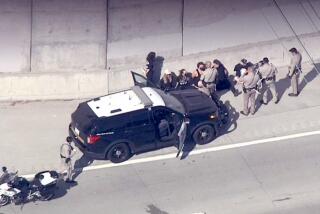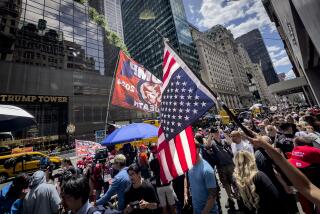A Pointed Symbol Brings Cross Words
- Share via
ALBION, Calif. — Crosses in hand, the protesters gathered in the predawn gloom along the Mendocino coastline, two dozen rural Californians sickened by the mounting body count of war.
Under a cold November rain, they busily pounded 2,035 foot-tall redwood symbols into the soggy ground along both sides of Highway 1 -- one for each U.S. serviceman and woman who had been killed in Iraq as of that date.
Said resident Beth Bosk: “The sea of crosses shows just how crowded the cemetery is getting.”
The gesture provoked an immediate response -- but not one the activists had anticipated. State highway crews soon arrived to tear down the crosses. Critics said that using a religious symbol in a protest was offensive at worst, insensitive at best. Defenders countered that the field of crosses was a fitting tribute to combatants fighting for their country.
Protesters are discovering that symbols, like certain words, can convey meanings never intended. Cross critics and defenders alike accuse each other of trying to hijack the icon’s powerful emotional image for their own ends.
Nationwide, the memorials, which evoke the seemingly endless rows of crosses of World War II-era cemeteries in Europe, are inspiring bitter exchanges and even violence.
Last summer, a man in Crawford, Texas, attached a pipe and chain to his pickup truck and mowed down many of the 2,000 crosses erected outside President Bush’s ranch. In December, vandals drove over 100 crosses that were part of a rural memorial in Stoutsville, Ohio. Vandals also removed several crosses erected last fall at the University of Georgia.
Organized by veterans and antiwar groups, cross memorials have sprung up along roadsides, in churchyards and on such public beaches as Santa Monica and Santa Barbara. Erected each weekend when visibility is highest and then dismantled, the displays often include small American flags, votive candles and the names and photos of dead soldiers.
Others, like the Albion memorial, are impromptu gestures by individuals -- permanent dedications of crudely made crosses. More crosses often are added as the number of war dead rises.
Detractors say the crosses do a disservice to the dead.
“I object to these groups who say they’re mourning for our soldiers -- people they didn’t even know,” said Deb Meyer, a South Bend, Ind., mother whose stepson died in Iraq in 2003. “There’s a difference between honoring the dead and counting bodies for your own political purposes.”
Recently, Meyer tried to retrieve one of 2,000 white crosses that activists erected outside a military recruiting office, but arrived after they had been removed.
“Yes, I’m aware my stepson was killed; I live with it every day,” she said. “For those people to use his death like that -- it was a slap in the face. I wanted that cross back.”
Sylvia Grider, an anthropologist at Texas A&M; University, said the cross isn’t the first symbol to cause division. During the Vietnam War, the circular peace symbol enraged many older Americans. Other symbols, like the Nazi swastika, are used to provoke a reaction.
“The point is that symbols draw attention and elicit an emotional response,” she said. “For most people, whether they realize it or not, that’s usually their intention of using [symbols].”
Michael Astley said he wasn’t trying to provoke anyone when he created a 10,000-square-foot memorial last September in a field outside the town of Stoutsville in central Ohio.
The memorial featured 676 white wooden crosses arranged like standing ranks of soldiers. A sign read: “The Cost of War; Final Formation.”
Tempers quickly flared, tiffs that often spilled into church when neighbors faced off after Sunday services. Soon, vandals drove over many of the crosses near Astley’s rural market.
Astley salvaged the broken crosses and re-erected them.
“I had heard talk, folks saying, ‘You know those crosses out on Highway 22? We ought to do something about them,’ ” said Astley, 52.
“You can see the crosses as a positive thing or the work of another damn peacenik trying to tear down the country. For those who vilified me, my message was misunderstood.”
Neighbor Art Dossman understands just fine.
“It’s not a memorial; it’s an anti-Bush demonstration,” said Doss, 75, a Korean War veteran. “He can keep those crosses up; it’s his land. But his sign should read, ‘The price of freedom.’ ”
Much of the cross debate is being argued on religious grounds. Detractors, saying the icons exclude Jews and Muslims, have pushed for the Star of David and the crescent moon to be added to memorials.
In Albion, critics called the crosses a thinly veiled religious statement about Christian supremacy that suggested a modern crusade against Muslims. The cross, they argued via a local Internet chat room, carried too much religious and historical freight to convey an unambiguous meaning.
“The cross is not a universal symbol,” said Marinela Miclea, a Bay Area software writer who spearheaded the Internet debate. “Not everyone who died in Iraq is a Christian. I know I would resent someone representing me with a cross.”
Another writer didn’t find fault with the crosses: “Two small sticks of wood nailed together and multiplied by 2000-plus is symbolically a simple and immediately powerful way to communicate the tragedy of lives lost. It’s a brilliant, heart-wrenching display.”
In Christianity, the cross is the faith’s most powerful symbol, representing both sacrifice -- Christ’s crucifixion -- and the promise of salvation.
But plain crosses also have been used for generations as nonsecular markers for the dead.
“People even mark the graves of pets with crosses,” said Grider, the anthropologist. “That cross doesn’t mean that Fluffy was a Christian; it just means Fluffy was a beloved pet now buried in a marked grave in the backyard. The cross furor seems an overreaction to a long-standing tradition.”
Activist Cliff Kindy didn’t take lightly his group’s decision to uses crosses at a memorial in Fort Wayne, Ind., for the more than 50 servicemen and women from the state who had been killed in Iraq.
“We debated it for weeks,” said the organizer for the Chicago-based antiwar group known as the Christian Peacemakers Team. “We struggled with questions about what the crosses represented. We didn’t want to hurt people’s feelings.”
Kindy didn’t even refer to the crosses as crosses. He called them “markers.”
Still, when the memorial moved last fall to a nearby college, a professor complained that it should have included icons for Jews and Muslims.
“It didn’t dawn on us to use any other symbol,” Kindy said. “But after it was brought to our attention, that’s what we did.”
Antiwar activists in Waterville, Maine, never considered using crosses in a memorial erected last fall, choosing instead another traditional icon: a white flag.
Lisa Savage said her group obtained a city permit to display the 2,000 flags, along with signs protesting the war. They worked hard to find a proper symbol to express their sorrow over lives lost in Iraq and briefly considered small U.S. flags. But they wanted a simple, unique image.
“Black flags were rejected as too morbid and red as too bloody,” she said. “White seemed a color associated with memorials and cemeteries.”
Local veterans insisted that the white flags signified surrender. In a Veterans Day standoff, five men were arrested for criminal trespass as they ceremoniously began pulling up flags before officers moved in to stop them.
“I was fuming,” said Wayne Elkins, a carpenter and Vietnam veteran who was one of those arrested. “Those people didn’t understand the symbol they were using. They needed to do their homework because those flags offended veterans.”
Savage says veterans stole their message: “If someone installs a memorial, why do other people get to define what it symbolizes? They can tell us they’re offended. They can’t tell us what we meant to portray.”
In Albion, 180 miles north of San Francisco, activists said their intentions also were misinterpreted.
Soon after the 2,035 crosses were erected, Caltrans workers began removing them -- not because of their political intent but because they were considered a safety hazard. Protesters called the action a desecration.
“Please don’t do that,” Bosk pleaded with the workers as she videotaped them. “Can’t you stop one minute and think why those crosses are here? You’re the same age as the men and women who are dying in this war. It’s a shame.”
The men continued throwing the crosses into a pile.
“I can’t debate this,” a supervisor said. “We’ve got to get these picked up.
“We’re sorry,” he added softly.
Activists later moved the crosses to a small, private, triangular field within sight of the town’s main market and post office.
Passersby have added flowers and small U.S. flags. Nearby is a plaque whose message begins: “Here are the symbolic grave markers for the young Americans who volunteered to fight and ultimately lose their lives in a sovereign country, halfway around the world.”
Most residents appear to support the memorial, organized by a local Vietnam veteran. The critics, they insist, are outsiders.
“These crosses can’t be claimed by any religion,” Bosk said. “They belong to every mother who gave birth to a son who has fallen in this war.”
Despite the controversy, she added, the crosses will stay where they are for now.
More to Read
Sign up for Essential California
The most important California stories and recommendations in your inbox every morning.
You may occasionally receive promotional content from the Los Angeles Times.







